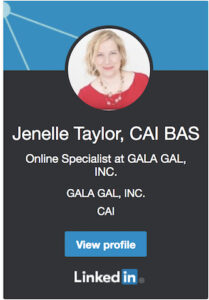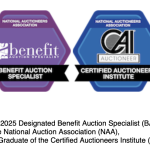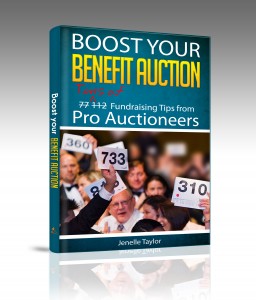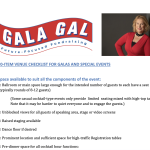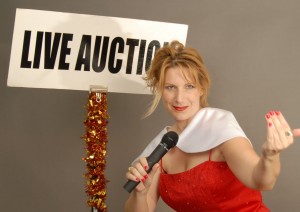►Live Auctions and Opening Bids
Today one of the fabulous auctioneers who has attended my “BOOTCAMP for Benefit Auctioneers” course e-mailed me with this question:
There is much debate on “starting” bids at B&C (benefit & charity) auctions. In commercial auctions we start where we think the FMV (fair market value) is….come down till we get a bid….and go till they stop. I have used this technique in B&C’s but some people start way low and get more people involved. I am really curious to get your perspective. And….do you do it different if there is a minimum….consigned item?
If you’ve attended even one live auction, I bet you’ve wondered as each item is being described, “I wonder where the bidding is going to open?”
At your charity fundraising gala, many people in your audience have that question too! Attendees often come up to me at the Live Auction Preview Table and ask, “What’s the opening bid for this package?” My typical response is, “Well, it’s my job to help you win this item. Where would you like it to start?”
Where each live auction package opens for bidding sets the tone for fundraising. One school of thought says to open the bidding at a low level (10-35% of retail value) in hopes of getting more bidders to jump in and get caught up in the auction excitement. If the bidding starts low and doesn’t quickly get a bunch of bids, however, what does that say to the crowd?? It might be sending the message, no-one-wants-this-item, no-one-is-bidding, this-is-a-fire-sale-not-a-fundraiser. Not the tone you want to set. On the other hand, if the audience perceives the opening bid to be so high that no one raises a bid card, you risk losing the auction participation and momentum.
Where to start the bidding on your charity gala’s live auction packages is a top concern faced by every similar event, and it’s why you want to trust your auction to a licensed, professional auctioneer who’s got both experience and specific fundraising training. A volunteer board member, DJ, or TV personality trying to be your auctioneer probably didn’t devote 90 minutes prior strategically gathering info at the Live Auction table, and he or she has much less experience with auction psychology, reading the crowd on the fly and knowing by instinct when to keep asking for a dollar amount and when to change things up.
I personally don’t like the technique used in commercial auctions of stating the retail price (fair market value) and quickly coming down (“Let’s start the bid at $5000, $5000 where, gimme $1000 and go…”). I’m not a fan of it when I attend an auction, and I think it’s confusing to a novice, non-auction savvy audience. Benefit audiences are on the whole unsure about the live auction bidding process, so I am always careful to be clear, easily understood, easy to follow and inviting to all.
I replied to my colleague that I honestly decide where to open each live auction package after I chat with all the attendees during the preview time. By then I know how much interest there is in each package and how much folks are expecting to pay. I auction by gut and by perceived value. For things $1000 and below, I often open at retail, but the values aren’t published, so I’m opening where I expect the crowd to join me. If it’s a private chef dinner for 6, then that certainly sounds more prestigious and inviting than $300 (the retail value) so I’d start at $300 and expect to go up. For items more in the $2K-$10K range, most of the time I open at 35-50%.
I rarely have to deal with consignment (items that aren’t donated but are a cost to the charity) because I don’t encourage it, but for that headliner consignment cost trip I follow the same as above typically: start at cost if the payback amount is $1000 or below, and for higher cost consignment items (some packages can require a payback cost of $5000-$10K or more!) I start below the minimum and take my chances. Auctioning items with high minimum required payback costs is nerve-wracking and not for the inexperienced DJ or Board member to try!!
Because auctioning items with a consignment payback cost always has the risk the bidding falling off and not reaching the minimum amount needed to sell it, I work with my clients to get a commitment in writing for how they want me to handle it if a consignment item doesn’t hit the minimum. As the auctioneer, I can either pass the item (awkward!), keep asking (and asking and asking and asking..UGH!) or disclose there’s a price below which I can’t sell it. Since none of those are very good options, I encourage the groups I work with to strive for 100% donated auction items. You keep all the money with none of the potential headaches and hassles. But, to do or not to do consignment is a whole ‘nother discussion, so let’s wrap this up by sharing how my colleague responded to the reply I sent him:
I think I will change my practice here. That makes so much sense….and I do like to work off the cuff so to speak and change as I determine what the crowd is doing. You may absolutely use the question and my name if you like.
Thanks Jenelle.
No, thank you, David Runte of Worstell Auction Company in Texas, for spurring a valuable discussion and helping so many groups raise more money!
